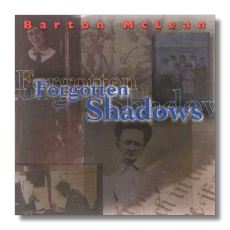
The Internet's Premier Classical Music Source
Related Links
- Latest Reviews
- More Reviews
-
By Composer
-
Collections
DVD & Blu-ray
Books
Concert Reviews
Articles/Interviews
Software
Audio
Search Amazon
Recommended Links
Site News
 CD Review
CD Review
Barton McLean

Electroacoustic Music
- Forgotten Shadows
- Ritual of the Dawn
- Happy Days
Various performers
CRI CD846 DDD 66:17
Barton McLean has an international reputation as a pioneer in electroacoustic music, both as a composer and as a performer. While he taught at major American universities, he developed a large-scale, commercially-available sequencer and sampler, and he became a noted academic in his field. However, since 1983, he and his wife, fellow electroacoustic composer/performer Priscilla McLean, have flourished outside of academia. They currently dwell in the village of Petersburgh, NY, where, as individuals and as "McLean Mix," they use their musical talents to explore environmental and cultural issues, and to experiment with the relationship between sound and sight. They seem like "just folks" – possibly the only electroacoustic composer/performers to inspire such a reaction!
The major work on this CD, Forgotten Shadows, is an "electro-surrealistic collage evoking the voices, music, and spirit of early 20th century life in two upstate New York villages," namely Petersburgh and Cincinnatus, Barton McLean's birthplace. The work began as part of an audiovisual installation that was developed to celebrate Petersburgh's history. McLean "extracted the best from the installation material, fusing it into a coherent, quasi-symphonic electroacoustic tape work." In Forgotten Voices, you will hear methods of music-making that were more common at the start of the century than at the end: fiddle, ragtime piano, musical saw, music boxes, women singing parlor songs and children singing game songs. McLean has skillfully shaped these elements into a compelling whole. The voices of older residents frame the work, alluding to disappearing landmarks, loss of community, and the acceleration of life's pace. While Forgotten Voices is not a tragic work, it seems regretful. In describing the original installation, McLean writes, "it seemed to evoke in visitors a feeling of communal timelessness, yet it also brought to mind the mortality of one's own brief existence." Forgotten Voices does this very well without the visual element, and it does it less pretentiously than Gavin Bryars' Sinking of the Titanic, a work that is not dissimilar. McLean's work makes us feel like wistful time-travelers.
In contrast, Ritual of the Dawn was written for a real-time ensemble consisting of flutes, clarinet, harp, electric piano, and percussion. Again, McLean mentions "the transience of our existence on this earth," which will "eventually return, eons from now, to its natural state of equilibrium." The title alludes to the ceremonies of people who lived in a pre-Colombian society more than six centuries ago. Ritual of the Dawn begins and ends with the luminous pulsations of the ensemble. "Groups of performers [play] different rhythmic cells simultaneously without coordinating their beats," explains McLean, an idea that sounds vaguely minimalist, but only the outer sections of the work actually confirm that impression. The score is kaleidoscopically varied; busy but essentially peaceful activity dominates, but there are shattering, cacophonous climaxes that suggest destructive forces at work.
Happy Days was written for "McLean Mix": Barton and Priscilla McLean at their most collaborative. "It depicts the fun and wonder of the ritual New Year's celebration," Barton McLean writes. Five music boxes, one playing "Happy Days Are Here Again," another playing "You Light Up My Life," play a prominent role, as do traditional seasonal noise-makers. These materials are enhanced with keyboards and a synthesizer. Barton McLean calls the work "lighthearted," but my ears hear something vaguely sinister afoot, particularly in his description of live performances in which his wife, in trying to coordinate the five music-boxes, "finally assumes the guise of a music box herself and 'winds down'." Maybe I am reading too much into this!
This is a gently provocative CD, and it encourages me to hear more of the McLeans's work. Thanks, CRI, for giving it this exposure. More about Barton and Priscilla McLean can be found at http://members.aol.com/mclmix2/.
Copyright © 2000, Raymond Tuttle


















